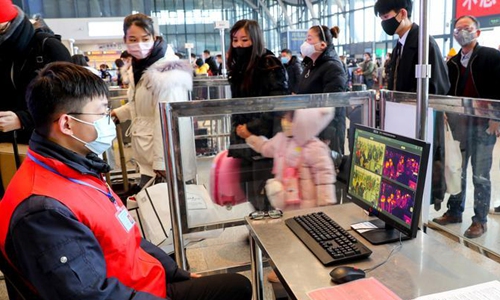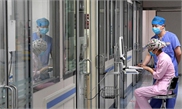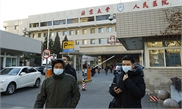SOURCE / INDUSTRIES
Foreign mask players see sales surge amid Novel coronavirus outbreak
Quality control, strengthened regulation needed for domestic manufacturers: experts

An employee of Wuhan train station in Central China's Hubei Province observes passengers' body temperature on January 21 amid outbreak of the novel coronavirus pneumonia. Photo: China News Service
As Chinese consumers turn to foreign face mask brands during the pneumonia outbreak in the country, and with stocks running out, it is high time that domestic mask firms reflect on the industry and build up confidence in their brands to win back consumers, analysts told the Global Times Wednesday.
The latest figures from the National Health Commission of China show 473 confirmed cases of the new form of coronavirus pneumonia as of 8 pm Wednesday.
Wearing a face mask especially the N95 mask or surgical mask is seen as a safe and simple way to fend off potential transmission of the virus, which originated in Wuhan, Central China's Hubei Province.
"The country's daily demand for masks can reach 50-60 million, yet the supply is about 20 million," said Cao Jun, general manager at the Zhejiang-based Lanhine Corp. Lanhine is mainly engaged in face masks and protective face shield production.
The company has urged its workers who have already returned home for the Spring Festival holidays to return to the production line by paying four times the regular salary, Cao told the Global Times.
The firm has been reached out to by customers who intended to place orders amounting to 100 million, Cao said, adding that the output is about 400,000 per day during the holidays and the products will mainly go to hospitals.
For the mass market where demand is surging, foreign brands like 3M and Honeywell are again seeing robust sales, similar to that following the outbreak of SARS in 2003, the bird flu in 2009 and serious air pollution in 2013-2014.
3M, a US brand popular in China, saw its N95 masks sold out on its online stores on e-commerce platforms Taobao and JD.com as of press time.
Some retailers hiked the price of 3M masks to 40 yuan ($5.8) for one, up from 3 yuan.
"3M is seeing increased demand for respiratory protection products in China following the outbreak of a newly identified coronavirus and is working to continue respirator production during the Chinese New Year holidays," Wei Moline, vice president of 3M Greater China Area, told the Global Times Wednesday.
For 3M respirators currently listed as out-of-stock in the 3M flagship stores on Tmall and JD.com, "we are working to replenish inventory as quickly as possible," Wei said.
Market demand for masks that fended off PM2.5 particles during the serious air pollution episodes in 2013 could have reached 2.53 billion yuan in China, with 3M mask sales exceeding $100 million with a quarter of the market share, according to media reports.
In 2009 when the H1N1 pandemic broke out in China, sales of 3M masks was 10 times normal, media reports said, citing an executive.
US firm Honeywell has also seen face masks selling well on Chinese e-commerce platforms.
"We have experienced an increase in demand for our personal protective masks in China. Due to the upcoming China Spring Festival, we are experiencing some logistical challenges, but our team has been working day and night to coordinate with the necessary resources to serve the market demand," Honeywell said in a statement sent to the Global Times on Wednesday.
Observers said the domestic mask industry needs to ramp up efforts to fix current issues like pursuing short-term profits and lacking innovation, in a bid to bolster their competitiveness with foreign players.
"There is a real need to strengthen regulation in the industry," Cao said.
Yang Wenjuan, head of research and development of Teda Filters Co based in North China's Tianjin, told the Global Times Wednesday that "technically, there is nearly no gap in filter media - key material in face masks - between 3M and domestic ones, yet the former has better brand management and consumer recognition."
Teda Filters will work overtime to provide the material for domestic mask producers to meet market demand, Yang said.



